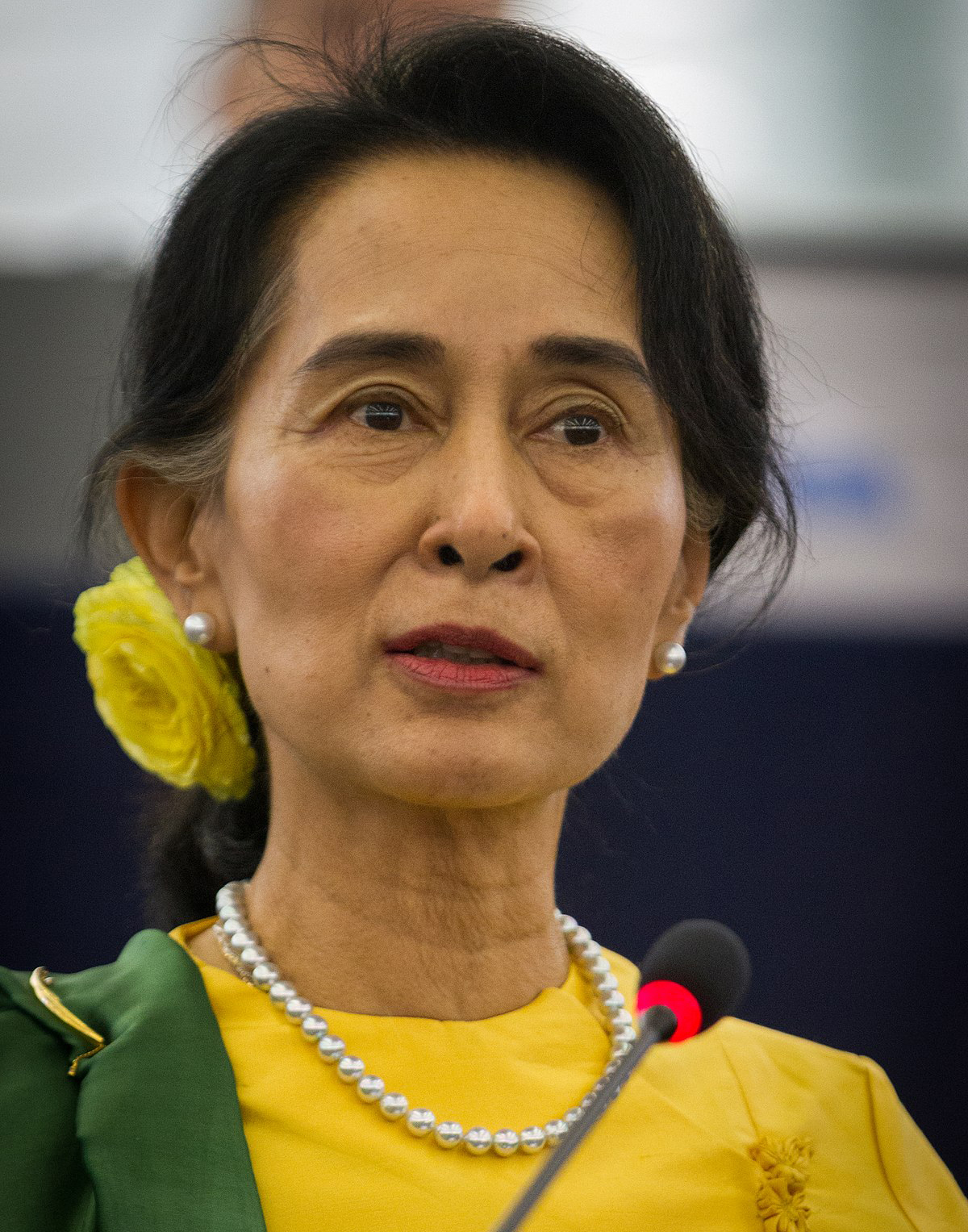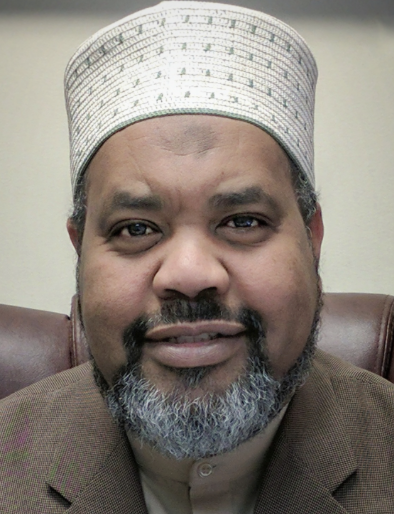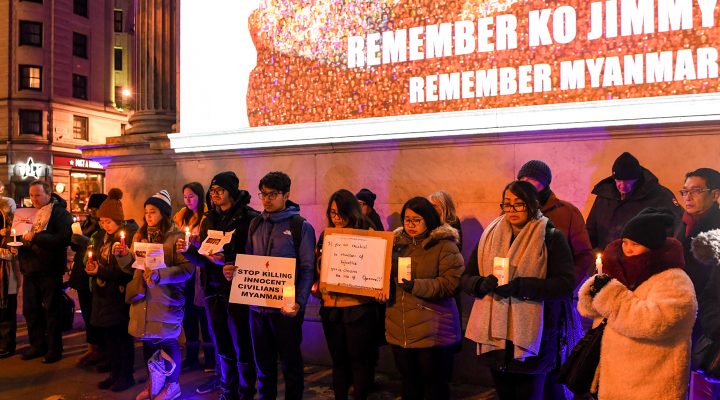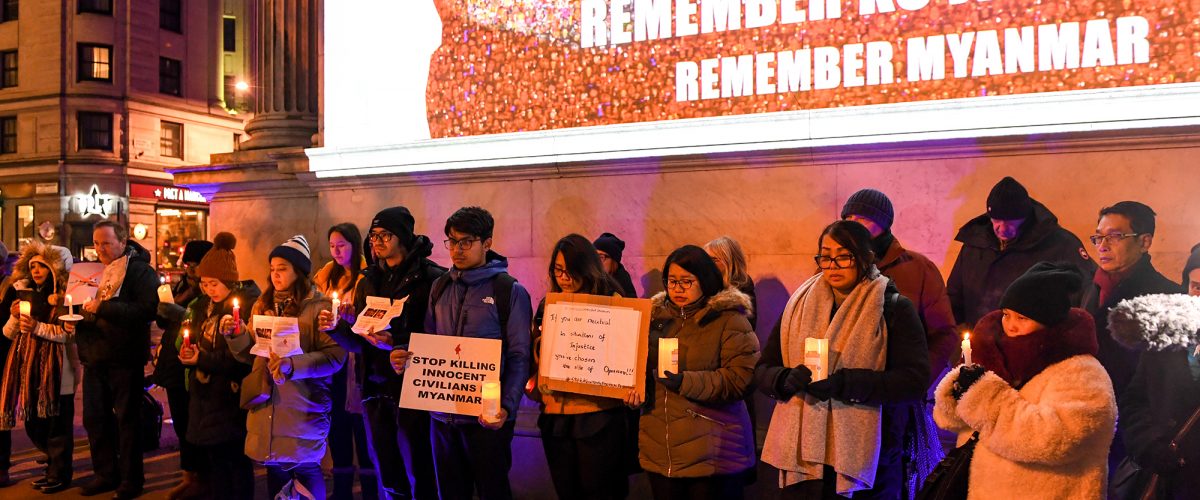The brutal military coup that murdered Myanmar’s infant democracy two years ago continues to deliver death and destruction upon the civilian population, with no end in sight.
Is anyone paying attention?
Bombings and the burning of entire villages increasingly mark the ruling junta’s attacks, according to news reports. The regime justifies these actions as necessary responses to rebel forces, who control many areas outside the main cities in the Southeast Asian nation, also known as Burma. The military has crushed public protests, arrested and imprisoned more than 18,000 citizens — and stands accused of the widespread use of torture and rape.
Nearly 3,000 people have been reported killed in the crackdown so far, almost certainly an undercount of the actual number of deaths. Thousands of homes, schools, clinics and places of worship (including Christian churches) have been destroyed, according to human rights groups.
The economy has collapsed. Hunger stalks the land. Half the population of 54 million lives under the official poverty line. An estimated 1.2 million people have been internally displaced. More than 70,000 have fled the country. Increasing numbers of civilians, especially young people, are joining the armed resistance.

Aung San Suu Kyi
The duly elected prime minister, 77-year-old Aung San Suu Kyi — world famous for her decades of human rights activism and struggle for Burmese democracy — languishes in prison, sentenced to 33 years for trumped-up crimes. The leaders of her toppled government, which decisively won the November 2020 elections, also sit behind bars. The military coup, carried out Feb. 1, 2021, prevented them from officially taking office the following day.
The junta announced an extension of the national state of emergency for another six months starting Feb. 1, effectively delaying elections promised for August of this year.
“Terrorists are terrorizing, disturbing, killing and destroying,” declared junta leader Min Aung Hlaing in justifying the extension. Presumably he was referring to resistance fighters, not his own notoriously vicious army, known as the Tatmadaw.
“Ming Aung Hlaing only cares about holding tight to power, and the rights and suffering of the Burmese people be damned,” charged Phil Robertson, deputy Asia director of Human Rights Watch, which monitors abuses in the country.
“The rest of the world, distracted by other wars and global crises, seems to pay little heed to the suffering.”
Yet the rest of the world, distracted by other wars and global crises, seems to pay little heed to the suffering.
Myanmar “has been forgotten,” said Tom Andrews, the United Nations Rapporteur for Myanmar, in a recent interview with CNN. The international community could do far more to hold the Burmese military accountable for its crimes, he added. The United States and other powers regularly denounce the Burmese military and its crimes against humanity, but coordinated action has not followed public statements.
“If (the conflict) remains in the shadows of international attention, then we are providing a death sentence to untold numbers of people,” Andrews warned.
“I want to ask the world to support us so our children’s death will not be in vain,” grieving mother Thida Win appealed to CNN. Her 7-year-old son, Bhone Tayza, was killed along with other children in a September 2022 attack on his school.
“Will you just look away from us? How many kids have to risk their lives?”
Not everyone is looking away.
Pope Francis strongly appealed for peace in Myanmar during a Jan. 22 address in St. Peter’s Square, joining with Burmese Catholic leaders in calling for an end to violence after the recent destruction of the Church of Our Lady of the Assumption in Chan Thar, one of the oldest and most important churches in the country. Francis visited Myanmar in 2017 and said he remains close to many of the faithful who are suffering there.
The United States Commission on International Religious Freedom called on the Biden administration Feb. 1, the two-year anniversary of the Myanmar coup, to “be more active in support for international efforts to hold the Tatmadaw and the Burmese authorities accountable with all the tools at their disposal, including coordinated sanctions against Tatmadaw leaders for particularly severe violations of religious freedom.”

Mohamed Magid
USCIRF Commissioner Mohamed Magid said the commission “stands in solidarity with the people of Burma who have endured great suffering in these two years since the coup. We urge the U.S. government to coordinate with international partners to hold the (military junta) accountable for its human rights abuses within Burma, especially its persecution of the Buddhist majority who do not want the authoritarian government to co-opt their faith, the predominantly Muslim Rohingya, and various Christian communities.”
“The Burmese military has a long history of inflicting violence on ethnic minorities in the country.”
The Burmese military has a long history of inflicting violence on ethnic minorities in the country — including genocidal attacks on the Muslim Rohingya people, many of whom have been killed or driven out of Myanmar, their historical homeland — and repeated conflicts with the Kachin, Chin, Karenni and Karen peoples, who are majority Christian.
Minority Christians include many Baptists. Baptists have a long history in Myanmar, going back to Adoniram and Ann Judson, the first American Baptist missionaries to go overseas. They arrived in Burma in 1813. Today, there are 1.7 million Burmese Baptists in Myanmar and in refugee camps in neighboring countries, according to the Baptist World Alliance, which identifies Myanmar as home to the second-fastest-growing Baptist population in the world.
The majority Bamar people of Myanmar, who are mostly Buddhist, number about 35 million, or 68% of the nation’s population. Persecution of ethnic minorities and non-Buddhists springs in part from British colonial rule (1824-1948), when Buddhist practices were suppressed. U Nu, a Buddhist nationalist and the first prime minister of independent Burma, preached this slogan: “Only the Bamar race, only the Burmese language, only the Buddhist religion.”
Since the 2021 coup, however, many Bamar people struggling under the military’s violent repression reportedly feel a new unity with Myanmar’s long-suffering minority groups. Many have asked forgiveness for past hatred and abuse. The government-in-exile, called the National Unity Government, promises a new constitution that will include rights and participation for minorities.
Will the new unity last if the people’s common foe, the military, is defeated? First, democracy and basic human rights must be restored.

Erich Bridges
Erich Bridges, a Baptist journalist for more than 40 years, retired in 2016 as global correspondent for the Southern Baptist Convention’s International Mission Board. He lives in Richmond, Va.
Related articles:
Pay attention to what’s happening in Myanmar, Baptist pastors plead
Baptist-led petition drive urges U.S. Congress to stop stalling on crisis in Myanmar


